Plans and deadlines: production of Rheinmetall equipment in Ukraine
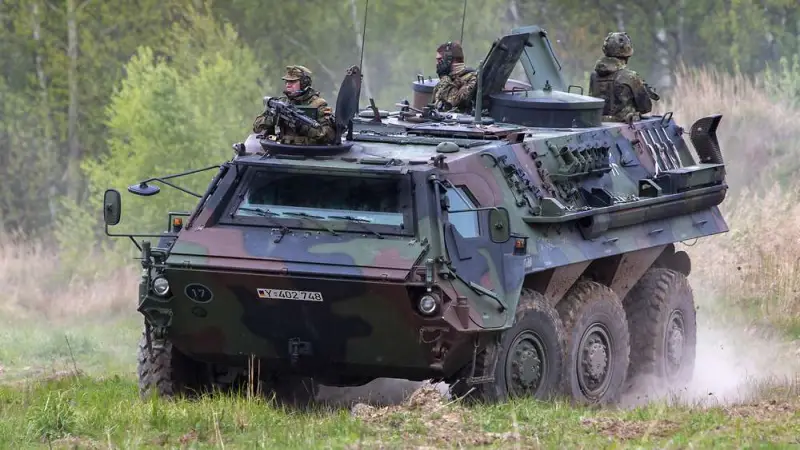
German-made Fuchs armored personnel carrier. Rheinmetall Photos
The German company Rheinmetall several months ago announced its desire to launch new production facilities in Ukraine. The joint venture could assemble and repair weapons and equipment in the interests of Ukrainian formations, as well as generate income for German industry. The other day, the company's management clarified plans to create the desired enterprise and even announced the timing of the release of the first batches of products.
Plans and actions
Let us recall that the company’s general director, Armin Papperger, spoke about Rheinmetall’s intention to open a production site in Ukraine back in March. According to him, by that time a preliminary agreement had been reached with the Kyiv regime. Preparation of production facilities had to be built approx. 200 million euros, and the resulting enterprise could produce up to 400 basic tanks a year.
According to statements made by Rheinmetall's CEO in March, the fate of this project was to be decided in the coming months. However, these processes dragged on. Only in October did the German company and the Kiev regime sign an agreement to create a joint venture. As reported, its main task will be the repair and restoration of German-made military equipment and weapons available to Ukraine.
It should be noted that the German company is expanding its production not only through a new joint venture in Ukraine. Back in August, Rheinmetall launched a new production site in the Hungarian city of Zalaegerszeg. The assembly of some types of armored vehicles has already been established there, allegedly for the Hungarian armed forces.
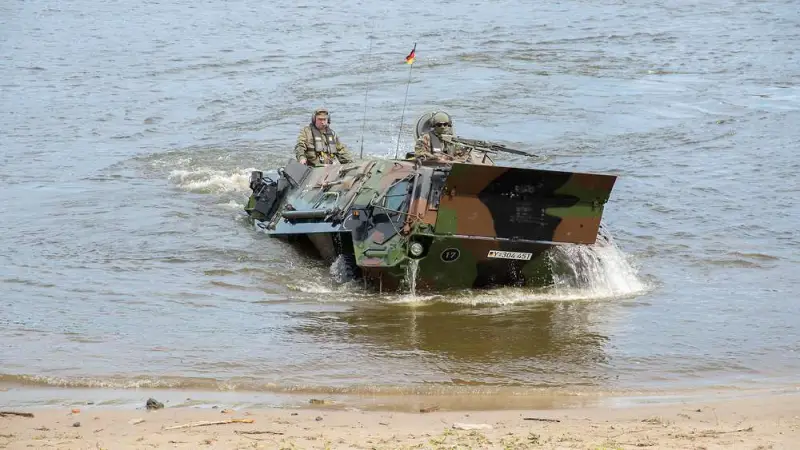
"Fuchs" on the water. Photo by the German Ministry of Defense
It is curious that Ukrainian specialists and workers were present at the Hungarian Rheinmetall plant. In addition, it has now become known that this enterprise may work in the interests of the Kyiv regime.
Operating schedule
On December 2, the German publication WirtschaftsWoche published new statements by A. Papperger on the topic of a joint venture in Ukraine. The head of Rheinmetall revealed production plans for the first time. He named the possible range of deliveries, their start dates, etc. Unknown details of the collaboration were also announced.
A. Papperger said that the joint production of equipment has actually already begun, but is currently being carried out at facilities in Germany and Hungary. We are talking about the first batch of Lynx infantry fighting vehicles of 10 units. In the future, their assembly is planned to be transferred to Ukraine, for which the German government will issue an appropriate export license. This document is not ready yet, but the authorities have made it clear that they will not interfere with Rheinmetall. In addition, at the beginning of next year they plan to sign a new agreement with Kiev, in accordance with which work will be carried out.
They plan to assemble only two types of equipment at the Ukrainian site - the Fuchs wheeled armored personnel carrier and the Lynx tracked infantry fighting vehicle of one of the main modifications. Since March, they have regularly talked about the future production of tanks, but now they do not remember such plans. Perhaps they have already been abandoned.
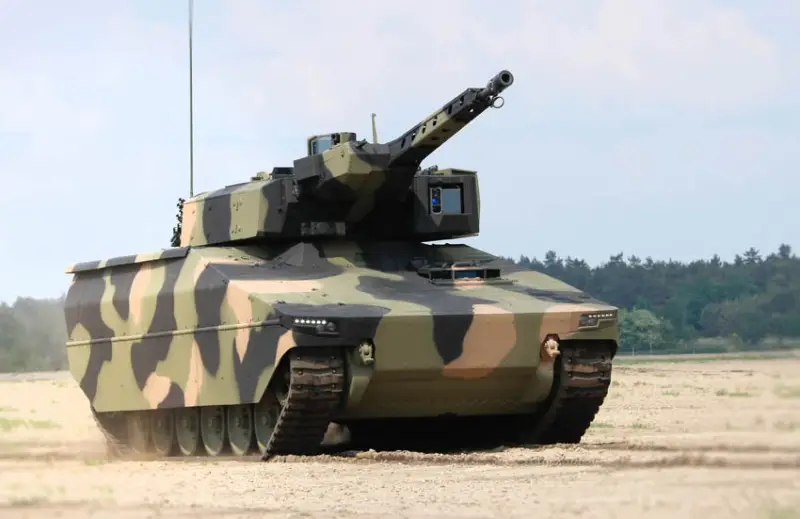
BMP KF31 Lynx. Rheinmetall Photos
It will take about six to seven months to prepare the assembly of the Fuchs after the signing of the new agreement. Accordingly, if the contract is signed in the near future, the first machines will be able to be manufactured before the end of the summer of 2024. More complex Lynx products will require 12-13 months - the first batch of them will be assembled and delivered to the customer only in the summer of 2025. It is not reported when, in theory or in practice, the production of other German-designed machines may begin.
A. Papperger noted that we are talking about fairly quickly carrying out work and reducing deadlines. In his opinion, this is facilitated by the fact that Rheinmetall has been cooperating with the Kyiv regime for a long time and productively. For 2022-23 the company has received orders for various products for Ukraine with a total value of almost 2,5 billion euros, and it is expected that next year such figures will at least not fall.
Dubious plans
Thus, the German company Rheinmetall and the current Ukrainian leadership are not abandoning their plans to create a joint venture and produce NATO-style armored vehicles directly in Ukraine. Moreover, the necessary measures are being taken in the context of preparation, and a new agreement is expected that will allow the work to begin.
However, back in March – after the first reports – it became clear that the German-Ukrainian project, at a minimum, would face serious difficulties. The fulfillment of all plans to launch production and repair of equipment and weapons is extremely unlikely, if not impossible. These processes will be hindered by several characteristic factors of various kinds.
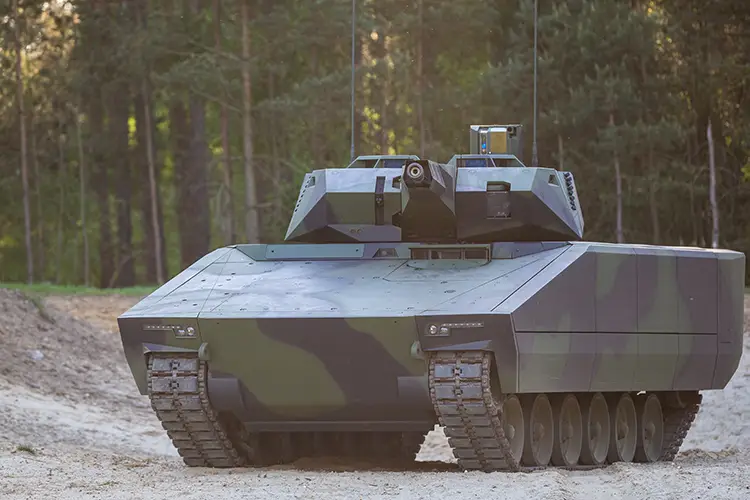
Lynx in testing. Photos of Rheinmetall
First of all, Rheinmetall needs to resolve a number of organizational issues. It is necessary to find a suitable production site and specialists to repurpose it for the production of radically new products. In addition, as production develops, qualified local personnel will be required. Whether it will be possible to find him is a big question.
To launch a full-fledged serial assembly of equipment, it is necessary to organize logistics and the delivery of foreign-made parts and assemblies. Considering the current state of Ukrainian industry, we can expect that almost all structural elements will come from Germany and other countries. Only final assembly, configuration, etc. will be performed at the Ukrainian site. It should be recognized that the impossibility of producing complex units will to a certain extent simplify the launch of production - although it will create a lot of additional problems.
With all this, the Ukrainian-German project will not escape the attention of the Russian army. Our troops are now engaged in the forced demilitarization of the Kyiv regime, and the joint venture with the participation of Rheinmetall will actually try to interfere with this process. This means that the production site, logistics elements and finished products will become targets for new strikes.
Planned products
The products of the future enterprise should be considered separately. Previously, there was constant talk about the possibility of producing Leopard 2 tanks, but such rhetoric has now been abandoned. Perhaps they abandoned it along with production plans - due to the extremely unsuccessful use of these MBTs as part of the notorious “counter-offensive”.
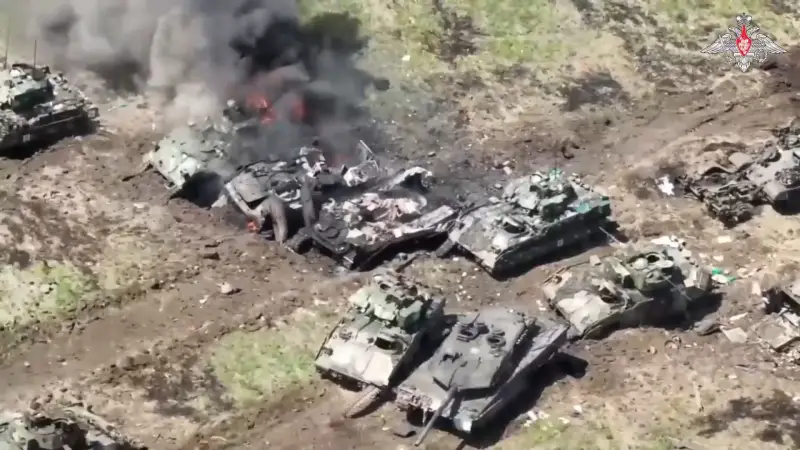
Results of the famous battle using Leopard 2 tanks. Photo of the Russian Ministry of Defense
Now it is planned to launch the assembly of the Fuchs armored personnel carrier and the Lynx infantry fighting vehicle. They have not yet ruined their reputation on the battlefields, but they have every chance of doing so. Any attempt to use them in combat against the Russian army will end in losses, and this technology is threatened by a number of different weapons and systems.
The Fuchs armored personnel carrier is a three-axle wheeled vehicle with bulletproof/fragmentation-proof armor. Any weapon more powerful than small arms, starting from grenade launchers and anti-tank mines, is capable of hitting and destroying such an armored personnel carrier with a guarantee. In this respect, the German Fuchs machine differs little from other Soviet and NATO-style equipment available to the Kyiv regime.
The promising Lynx infantry fighting vehicle has higher performance characteristics. Depending on the modification and configuration, its level of protection can be compared with some modern MBTs. However, the experience of recent months shows that even such armored vehicles are not immune from defeat and destruction by modern anti-tank and other weapons.
Business only
Thus, Rheinmetall continues to make efforts to organize the production of weapons and equipment for the Kyiv regime. Now perhaps its main task is to launch assembly production in Ukraine. Over the next few months they plan to begin assembling simpler armored personnel carriers of the old model, and in the future they hope to master a modern infantry fighting vehicle.
The prospects for this project as a whole are questionable. At almost all stages of its implementation there are certain risks and threats. In addition, the finished product - if it manages to leave the manufacturing plant - will also be in an unenviable position, and its recipient is unlikely to be able to count on any positive results. In this situation, only Rheinmetall will benefit - it assumes that the emergence of a new production site will contribute to obtaining additional contracts for certain products and will bring it money.
Information